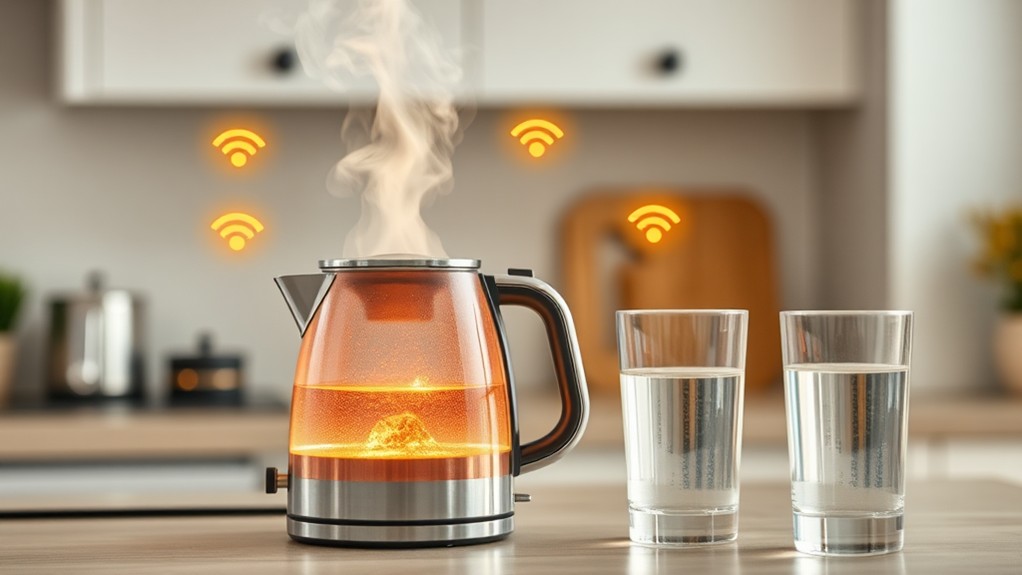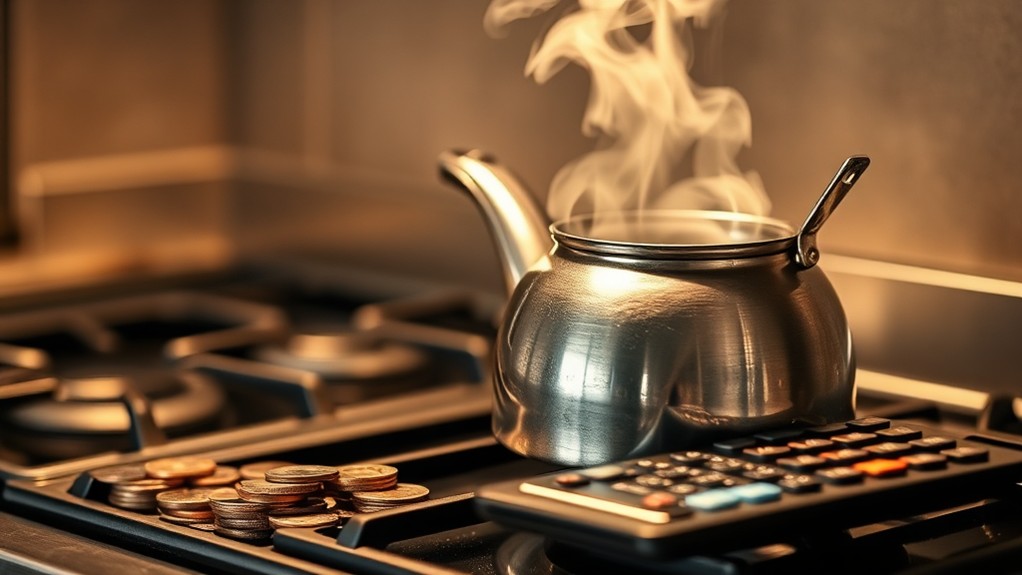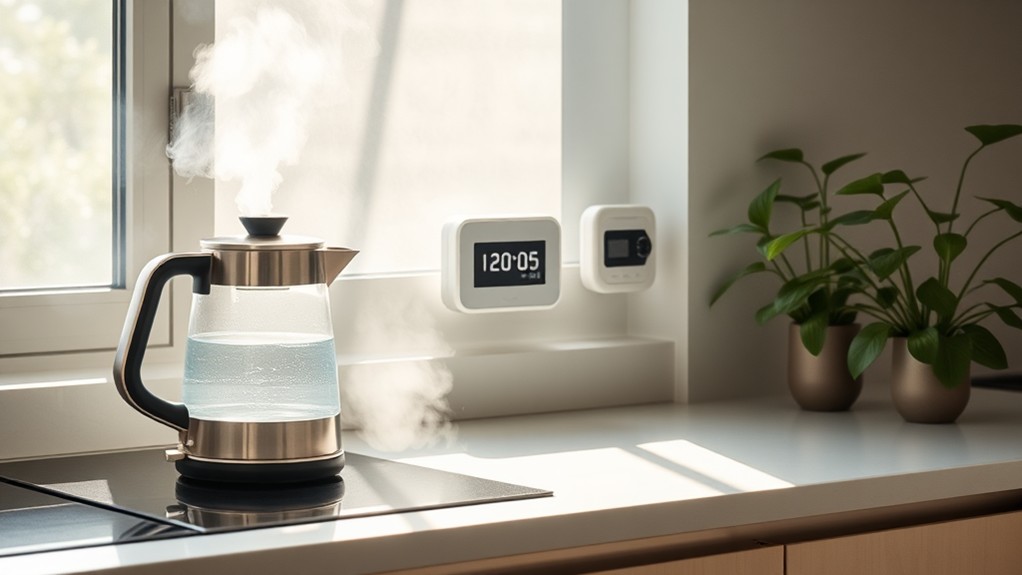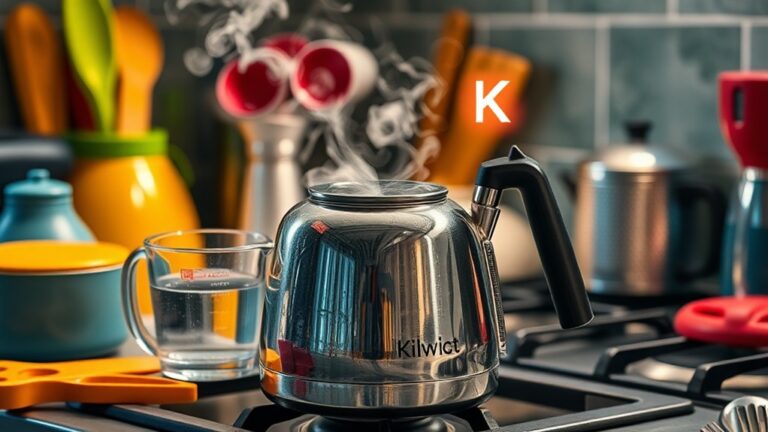To boil 1 liter of water, I've found it takes about 0.112 kilowatt-hours with an electric kettle. That's roughly 6 cents in electricity costs, depending on the rates. If you use a more powerful kettle, you can boil water faster, but the energy needed stays around the same. Other methods, like microwave ovens or induction stoves, might use similar amounts of energy but can vary in efficiency. It's all about picking the right tool for the job. If you stick around, you'll discover tips on saving energy and costs while boiling water efficiently.
Energy Required to Boil Water

When it comes to boiling water, it's helpful to know how much energy we actually need. If I want to boil 1 liter of water, starting from a temperature of 20°C to the boiling temperature of 100°C, I need about 334 kJ of energy, which is around 0.1 kWh. This energy is related to the heat capacity of water, which tells us that it takes 4.2 kJ to raise the temperature of 1 kg of water by just 1°C.
So, to achieve an 80°C increase, we're looking at a total of 336 kJ.
Using an electric kettle can make this process quicker and more efficient. A typical 1 kW electric kettle takes about 3.34 minutes to boil 1 liter of water, while a more powerful 2 kW kettle can do it in around 1.67 minutes.
The energy efficiency of these kettles is key; they require roughly 0.112 kWh for that same 1 liter. No matter what method you use, at sea level, the energy required to boil water stays constant, but the actual energy consumption can differ based on how effective the appliance is.
Efficiency of Heating Methods
Boiling water isn't just about the energy needed; it's also about how efficiently different methods use that energy. For instance, I've found that using an electric kettle is one of the best options. Despite requiring about 0.112 kWh to boil 1 liter, it gets the job done in just 2 minutes and 45 seconds. That's a quick way to raise the temperature!
On the other hand, microwave ovens have a lower efficiency, around 30%, and typically take 1 to 1.5 minutes for smaller amounts of water. While they might seem fast, they don't always use energy as effectively.
I've also noticed that induction stoves are pretty efficient, needing about 0.116 kWh but boasting an 80% efficiency rating. This means they use energy well while heating water.
Interestingly, gas kettles are less efficient, using about 0.019 cubic meters of gas to boil 1 liter, translating to around 25% efficiency.
With so many methods available for boiling water, I find it helpful to reflect on how much energy is needed versus how efficiently that energy is used. Making the right choice can save time and energy.
Cost Analysis of Boiling Water

The cost of boiling water can really add up over time, so it's wise to reflect on your options. If I'm looking to boil 1 liter, I want to evaluate how different energy sources affect my bills.
Using electricity, it costs about 6 cents at peak rates, but if I time it right, I can boil when rates drop to around 1.503 cents. On the other hand, with a gas hob, the cost plummets to about 2.22 cents. That's a significant difference!
Here's a quick breakdown of costs based on the energy source:
| Energy Source | Cost to Boil 1 Liter |
|---|---|
| Electric (Peak) | 6 cents |
| Electric (Off-Peak) | 1.503 cents |
| Gas Hob | 2.22 cents |
It's clear that the starting temperatures and amount of water I'm boiling can lead to energy losses, affecting my total cost. Upgrading to energy-efficient appliances can further help mitigate these costs. Overall, understanding the cost to boil water helps me make informed choices and saves me money in the long run!
Environmental Impact of Heating
In today's world, understanding the environmental impact of heating water is more important than ever. Each time we boil a liter of water, we contribute to our household's energy consumption and carbon footprint. For instance, boiling water with an electric kettle generates about 88 grams of CO2 emissions, while a gas hob results in only 33 grams.
Switching to energy-efficient appliances can greatly reduce energy waste. Here are a few considerations to keep in mind:
- Look for automatic shut-off features in electric kettles.
- Gas cooking often proves cheaper and more environmentally friendly.
- Be aware of heat loss; some kettles retain heat better than others.
- Regular maintenance of water heaters helps improve performance and efficiency.
- Mind your energy consumption; small changes can lead to significant reductions in emissions.
Choosing the right method to reach the boiling point can make a big difference. By making informed decisions, we can adopt more sustainable practices and lower our carbon footprint.
Using a generator or opting for energy-efficient appliances can help us stay mindful about our impact on the environment.
Tips for Energy Efficiency

When it comes to heating water more efficiently, I've found that a few simple changes can make a noticeable difference. First, only use the amount of water you need to boil. If your kettle requires more than one litre, it'll use much energy unnecessarily. Covering your pot while boiling helps trap heat, speeding up the process and saving energy, too. I've noticed significant reductions in boiling time just by placing a lid on my kettle.
Regular maintenance is essential. Descale your kettle often to guarantee it works at peak efficiency. A well-maintained appliance can increase the temperature quickly while also being kinder to your energy bill. For smaller amounts of water, consider using the microwave, as it can be a more energy-efficient way to produce boiling water.
Lastly, exploring alternative heating methods, like solar water heaters, can really help reduce reliance on power stations. Here's a quick summary of my tips:
| Tip | Benefit | Example |
|---|---|---|
| Use only necessary water | Reduces energy needed to boil | Boil 0.5 litre instead of 1 |
| Cover your kettle | Traps heat, saving energy | Use a lid while boiling |
| Regular maintenance | Best performance, less cost | Descale every month |
Conclusion
To sum up, boiling 1 liter of water typically requires about 0.1 to 0.12 kilowatt-hours, depending on the heating method you use. By choosing efficient appliances and being mindful of your usage, you can save energy and money. Little changes, like using a kettle instead of a stove, can make a difference. Remember, every bit helps! So next time you boil water, think about how you can do it more efficiently without sacrificing convenience.

